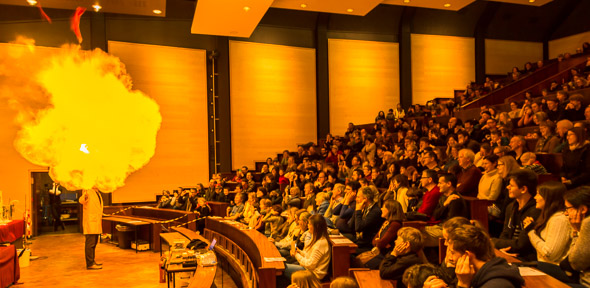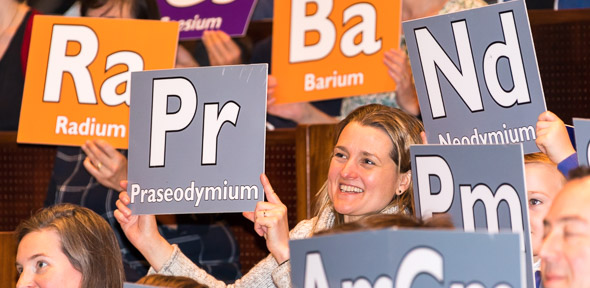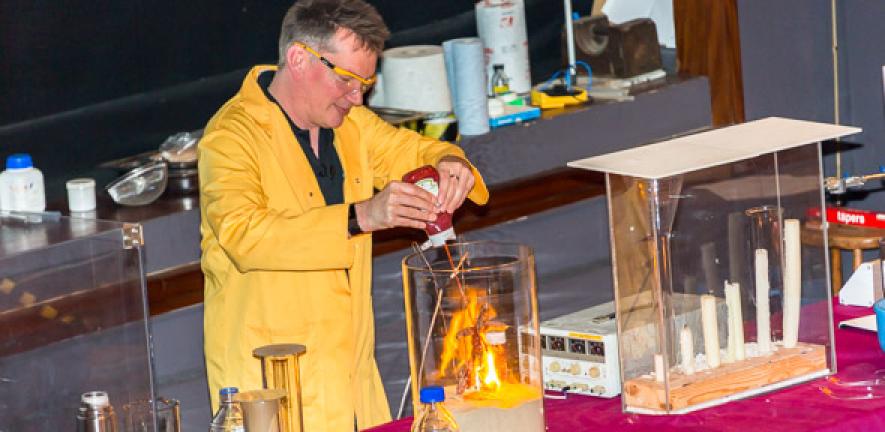
Peter is a popular Teaching Fellow in the department and Director of Studies in Chemistry at St Catharine’s College, who has devoted much of the last 25 years to science outreach.
As proof of the impact he has had, witness the many students who were first inspired to study chemistry after seeing one of Peter’s outreach lectures.
Imogen Woods-Wilford is a case in point. As a child in the early noughties, she was taken to see Peter’s Open Day lectures. ”My annual trips to watch Peter’s lectures at the Cambridge Science Festival when I was a kid were what inspired me to study Natural Sciences at Cambridge,” says Imogen, who recently completed her final year at Downing College.
And when Peter gave a televised lecture of his Royal Institution Christmas Lectures in Singapore, he was joined on stage by a young volunteer named Zhihan Nan. Zhihan later became one of Peter’s chemistry students at St Catharine’s and is now completing a PhD at Harvard.
“Peter has given us a visibility beyond Cambridge – he is very well known in the school chemistry community, which has improved our profile,” says Head of Department James Keeler.
What is science outreach?
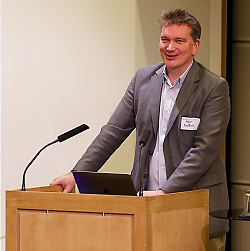 Left: Peter at the 2023 Alumni talk in February
Left: Peter at the 2023 Alumni talk in February
Outreach has been given increasing importance and visibility by the scientific community over the last decade, and many grants now incorporate an outreach requirement. However, it is hard to find a precise definition: outreach seems to mean different things to different people.
“I think outreach is about going to engage with people rather than expecting them to come to us,” says James. “What you need will vary for different groups and communities, depending on what the aim is.”
Outreach can also be tailored for different age groups and education levels. “For some people, outreach is playing around with cornflour,” says Peter. “For others, it’s getting PhD students to talk to sixth formers.”
For example, the Chemistry Open Day held during the Cambridge Festival in spring has many hands-on activities which attract primary school children – including the ever-popular cornflour slime. Peter says: “The Open Day is designed to catch their interest at a very young age.”
This rings true with Dillon Cleveland, a third-year NatSci undergraduate specialising in Chemistry, who volunteered to help with the cornflour slime experiment at this year’s Open Day. “I think it’s really nice sharing science knowledge, especially with the younger generation,” he says. “When I was their age I came to a lot of things like this, and it really contributed to me wanting to do science. It’s sort of nice to be on the other end of that.”
On the other hand, Peter’s legendary Open Day demonstration lectures have traditionally been aimed at children and adults alike. “The lectures were designed with strong but accessible scientific messages that get both children and adults excited,” he explains. “It’s very satisfying when I’ve given lectures and not only the kids but their parents come along afterwards and say ‘I never got that at school.’”
On a larger scale, in 2012 Peter was invited to give the prestigious Royal Institution Christmas Lectures, which are aimed at young people and reach a worldwide audience. More locally, he has given regular lectures for audiences of department alumni on topics such as the Periodic Table, the naming of the Elements and pioneering chemist Jane Marcet.
Then there are activities like the Cambridge Chemistry Challenge for Lower Sixth students (known as C3L6), which Peter developed for Year 12 students who are already studying chemistry. In this case, Peter says the purpose of the activity is to “put chemistry in a context they are not familiar with so that they face a new challenge."
Teamwork
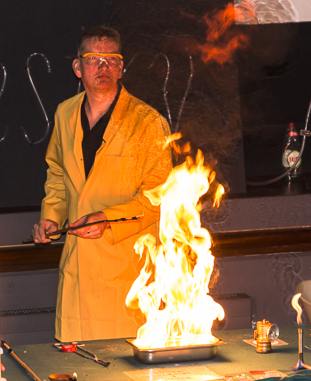
None of these activities is accomplished alone, of course. Emma Powney plays a key role in supporting Peter and other departmental outreach activities. Emma had been working as a secretary in the department when she was asked in 2007 to help organise the increasingly popular Open Day, which at the time was mainly student-led with the support of Dr Paul Barker.
Since then Emma has never looked back. She not only marshals the many aspects of Open Day with swift efficiency, but has also acted as chief administrator for most of Peter’s other outreach activities. Emma says: “I’ve been doing this since 2007 because I love working with the undergrads, postgrads and all members of the public.”
Above: Open Day lecture 2015
C3L6
One of Peter and Emma’s most complex outreach activities is the Cambridge Chemistry Challenge (C3L6), an enormous operation which relies on a large number of dedicated volunteers. The scheme is run as a competitive examination for around ten thousand Year 12 students studying chemistry in the UK. The 50 top entries are invited to stay in Cambridge for a weekend, with two full days of activities and exercises in the department’s teaching labs.
Peter and the C3L6 committee, which is composed of Cambridge students and teachers from all over the country, create new exam questions each year which are distributed to all the schools that enter the competition The schools mark the papers before submitting them, but committee members re-mark a selection, to ensure consistency. After choosing the winners, they send out thousands of certificates in the course of a single weekend. “It has become very much a part of many schools’ timetable,” says Peter.
Peter is excited that next year C3L6 will be expanding its outreach to China. The students in China will be assessed according to the same criteria as the UK students, but it will be a separate competition.
Chemistry Olympiad
Peter was also involved for many years in the RSC UK Chemistry Olympiad and offered the department’s teaching labs for the practical assessments. “I participated in the Chemistry Olympiad as a student in 1987,” recalls Peter. “So I decided to become involved when I had a position in the department, and remained involved for 20 years.”
Winners of the Chemistry Olympiad go on to participate in the prestigious International Chemistry Olympiad. A highlight of Peter and Emma’s involvement was in 2009 when the 10-day event was hosted in the UK in Cambridge for the first time in its 54-year history. Over 800 people from 67 countries were involved in an operation that both Peter and Emma recall as “extremely challenging.”
A number of postdocs, as well as several academics in the department, including Dr Alex Thom and Teaching Fellow Dr John Morgan, have happy memories of participating in the Olympiad when they were students.
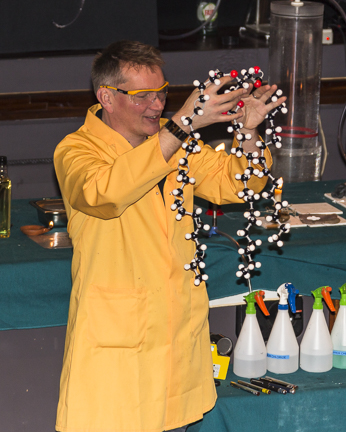 Right: Molecules are fun!
Right: Molecules are fun!
Return of the Open Day Lectures
Afficianados of Peter’s Open Day lectures will be thrilled to learn that, after a four-year hiatus, Peter plans to resume the lectures next year.
Audiences will be excited to see the return of the lectures, which were first shut down by Covid and then by the loss of several skilled technicians behind the scenes. Peter emphasises that the technicians are crucial to the success of the lectures.
In previous years, the two main technicians helping Peter were Chris Brackstone and Mark Hudson, but both have now left the department. Other key technicians, including Mykola Karabyn and Pat Chapman, retired some years ago.
Each lecture includes about 20 different demonstrations, and a new lecture takes years to develop. “First you need to work out what you want to say, and then how to put things together in a fun way which will still communicate your message,” says Peter.
He adds: “None of our events, especially the Open Day demonstration lectures, could happen without the technicians. This includes the glass, wood and mechanical workshops, who have all helped develop and build equipment for the lectures. There is an army of people behind us.”
In preparation for next year, Peter will be working closely this summer with new technicians Sarah Mitchell and Tom Wilkins to re-create everything needed for Peter’s lecture “Just Add Water,” last done in 2016.
“Sarah and Tom are the technicians who look after the physical labs, but next year they will help with the demo lectures,” explains Peter. “This is a massive task. These demos are potentially dangerous, and we will have to go through every technique. It can take weeks and weeks to get them right – basically, it will take the whole summer.”
“Chris and Mark, who also supported me when I gave the Royal Institution Christmas Lectures, helped put together the original lectures and learned incrementally, but Tom and Sarah have been thrown in at the deep end.”
Peter continues to brim with endless enthusiasm for chemistry and outreach. “I love my subject and want to communicate it,” he says.
James adds: “We couldn’t put on outreach like our Open Days and Peter’s lectures without the Walters-Kundert Foundation, who have provided ongoing financial support. We are so grateful for their help.”
Peter has been promoted to Professor via the University's new Teaching and Scholarship pathway, effective as of 1 October. This recognition of the significance and impact of teaching is an incredibly important development for the University.
Below: Fire seems to be a popular theme!
